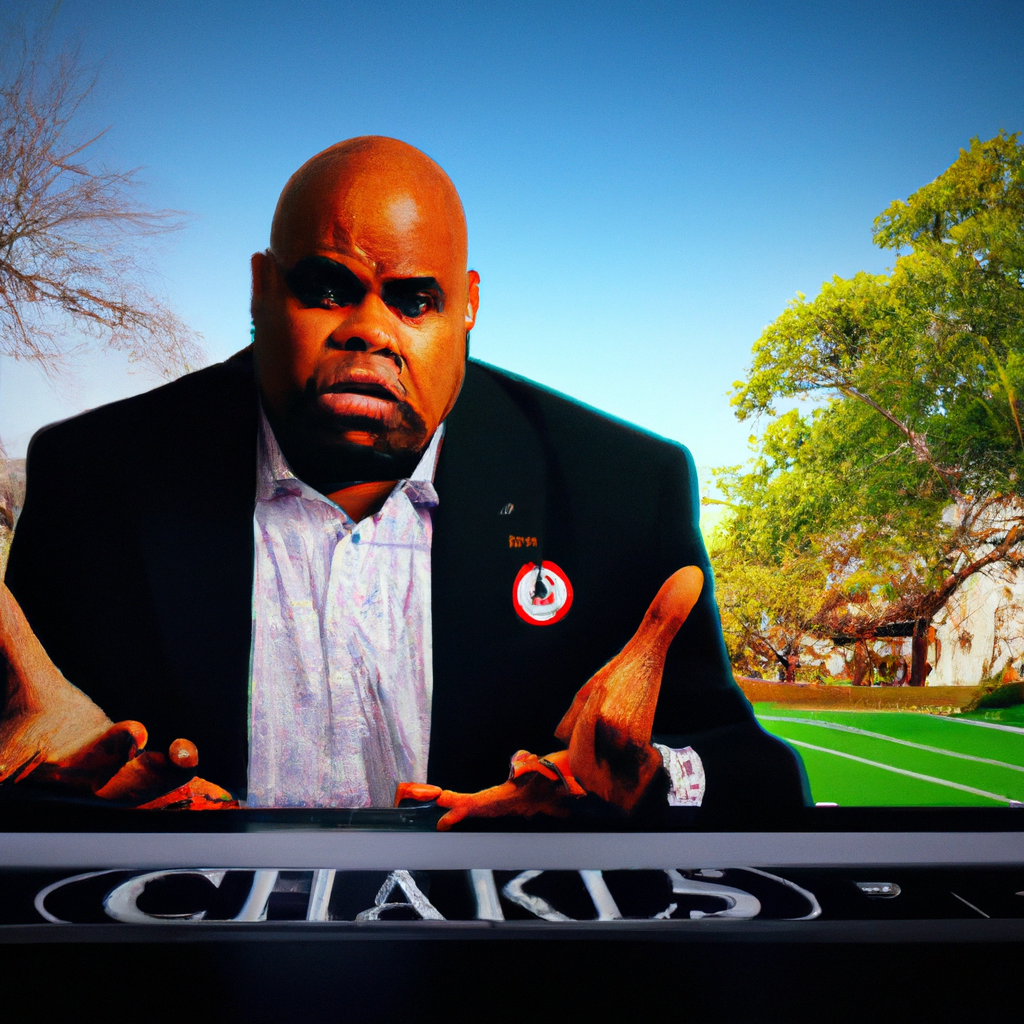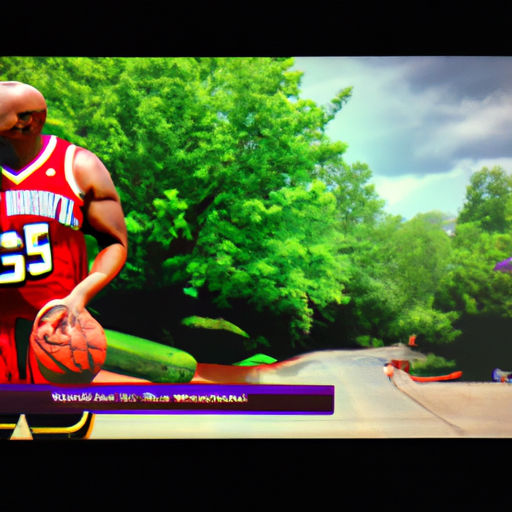Charles Barkley unhappy with college sports changes: “We have totally f*cked it up”

The Impact of Commercialization on College Sports: Charles Barkley’s Perspective
Charles Barkley, the former NBA star and current sports analyst, recently expressed his discontent with the changes that have taken place in college sports. In a candid interview, Barkley stated, “We have totally f*cked it up.” These strong words reflect his frustration with the increasing commercialization of college athletics and the negative consequences it has had on the integrity of the game.
Barkley’s perspective on this issue is worth considering, as he has a deep understanding of both college and professional sports. Having played basketball at Auburn University before embarking on a successful NBA career, Barkley has experienced firsthand the unique environment and values that college sports traditionally embody. He believes that the commercialization of college sports has eroded these values and compromised the essence of the game.
One of Barkley’s main concerns is the influence of money on college sports. He argues that the pursuit of profit has overshadowed the educational mission of universities and the development of student-athletes. With lucrative television contracts, corporate sponsorships, and endorsement deals, college sports have become big business. This shift has led to a distorted focus on revenue generation rather than the holistic development of student-athletes.
Furthermore, Barkley criticizes the exploitation of student-athletes by the NCAA and universities. While colleges and universities profit immensely from the success of their athletic programs, the athletes themselves often receive little compensation. Barkley believes that this is fundamentally unfair and that student-athletes should be fairly compensated for their contributions to the financial success of their institutions.
Another consequence of commercialization, according to Barkley, is the erosion of the amateur spirit in college sports. Traditionally, college athletes competed for the love of the game and the pride of representing their schools. However, with the influx of money, the pressure to win at all costs has intensified. This has led to scandals, recruiting violations, and a win-at-all-costs mentality that tarnishes the integrity of college sports.
Barkley also expresses concern about the impact of commercialization on the academic experience of student-athletes. With the demands of rigorous training schedules and travel commitments, many student-athletes struggle to balance their athletic and academic responsibilities. This can result in compromised academic performance and limited opportunities for personal growth outside of their sport. Barkley believes that the emphasis on commercial success has overshadowed the educational mission of universities, ultimately shortchanging student-athletes.
In conclusion, Charles Barkley’s perspective on the impact of commercialization on college sports sheds light on the negative consequences of this trend. He argues that the pursuit of profit has compromised the integrity of the game, exploited student-athletes, eroded the amateur spirit, and hindered the academic experience of student-athletes. While commercialization has undoubtedly brought financial benefits to universities and the NCAA, Barkley’s critique serves as a reminder that the true essence of college sports should not be overshadowed by monetary considerations. It is essential to strike a balance between financial success and the values that have made college sports a cherished tradition. Only then can we ensure that college sports continue to provide a meaningful and enriching experience for student-athletes and fans alike.
Examining the Shift in College Sports: Charles Barkley’s Critique

Charles Barkley, the former NBA star and current sports analyst, recently expressed his dissatisfaction with the changes happening in college sports. In a candid interview, Barkley boldly stated, “We have totally f*cked it up.” These strong words from a prominent figure in the sports world have sparked a debate about the direction college sports are heading.
Barkley’s critique centers around the increasing commercialization of college sports. He argues that the focus has shifted from the development of student-athletes to making money. According to Barkley, the NCAA and universities are more concerned with television contracts, sponsorships, and ticket sales than with the well-being and education of the athletes.
One of Barkley’s main concerns is the exploitation of student-athletes. He believes that these young individuals are being used as commodities, generating enormous revenue for their universities without receiving adequate compensation. Barkley argues that the current system is unfair and that athletes should be allowed to profit from their own likeness and endorsements.
Furthermore, Barkley criticizes the NCAA’s strict rules and regulations that limit the freedom of student-athletes. He believes that these rules prevent athletes from fully enjoying their college experience and hinder their personal and professional growth. Barkley suggests that the NCAA should adopt a more flexible approach, allowing athletes to make decisions about their own careers and futures.
Another aspect of college sports that Barkley finds troubling is the lack of diversity among coaching staff. He argues that there is a severe underrepresentation of minority coaches in college sports, particularly in high-profile positions. Barkley believes that this lack of diversity perpetuates inequality and hinders the development of young athletes who could benefit from diverse role models.
Despite his criticisms, Barkley acknowledges that college sports still hold value. He recognizes the positive impact that sports can have on young athletes, providing them with opportunities for personal growth, discipline, and teamwork. However, he believes that the current system needs significant reform to ensure that the focus remains on the well-being and development of the student-athletes.
Barkley’s critique has ignited a broader conversation about the future of college sports. Many agree with his concerns and argue that changes are necessary to address the issues he raises. However, others argue that the current system is necessary to maintain the integrity and competitiveness of college sports.
In response to Barkley’s critique, some universities and organizations have taken steps to address the concerns he raises. For example, the NCAA recently announced that it would allow student-athletes to profit from their name, image, and likeness. This decision marks a significant shift in the NCAA’s stance on compensation for athletes and is seen as a step towards addressing the exploitation Barkley highlights.
In conclusion, Charles Barkley’s critique of the changes in college sports has sparked a much-needed conversation about the direction of the industry. His concerns about the commercialization, exploitation, and lack of diversity in college sports have resonated with many. While there is still much work to be done, Barkley’s critique has shed light on the need for reform and has opened the door for change in the world of college sports.
Charles Barkley’s Discontent with Changes in College Sports: A Closer Look
Charles Barkley, the renowned former NBA player and current sports analyst, has recently expressed his discontent with the changes occurring in college sports. In a recent interview, Barkley boldly stated, “We have totally f*cked it up.” These strong words from a prominent figure in the sports world have sparked a heated debate and shed light on the issues plaguing college sports today.
One of the main concerns Barkley raised is the increasing commercialization of college sports. He argues that the focus has shifted from the development of student-athletes to making money. Universities and athletic programs are now more concerned with securing lucrative television deals and sponsorship agreements rather than prioritizing the well-being and education of their athletes. Barkley believes that this shift in priorities has led to a decline in the overall quality of college sports.
Another issue Barkley highlighted is the exploitation of student-athletes. He argues that these young athletes, who bring in significant revenue for their universities, are not adequately compensated for their efforts. While universities profit from ticket sales, merchandise, and endorsements, the athletes themselves are often left struggling to make ends meet. Barkley believes that this is fundamentally unfair and that student-athletes should be fairly compensated for their contributions.
Furthermore, Barkley expressed his concern about the increasing influence of agents and shoe companies in college sports. He believes that these external entities have too much power and control over the decisions made within college athletic programs. This, in turn, compromises the integrity of the game and undermines the values that college sports should uphold. Barkley argues that the focus should be on the development of young athletes, rather than on the financial interests of these external entities.
In addition to these concerns, Barkley also criticized the NCAA’s handling of various scandals and rule violations. He believes that the NCAA has failed to effectively address and punish those who break the rules, leading to a lack of accountability within college sports. Barkley argues that stricter regulations and harsher penalties should be implemented to ensure that the integrity of the game is upheld.
Despite his discontent, Barkley acknowledges that finding a solution to these issues is not easy. He believes that a comprehensive reform of the college sports system is necessary, but it will require the cooperation and commitment of various stakeholders, including universities, athletic programs, the NCAA, and even the government. Barkley emphasizes the importance of prioritizing the well-being and development of student-athletes, as well as ensuring their fair compensation.
In conclusion, Charles Barkley’s discontent with the changes in college sports highlights the pressing issues that need to be addressed. The commercialization of college sports, the exploitation of student-athletes, the influence of external entities, and the lack of accountability within the NCAA are all concerns that Barkley has raised. While finding a solution may be challenging, Barkley’s outspoken criticism serves as a wake-up call for all those involved in college sports. It is time to reevaluate the priorities and values of college sports and work towards a system that truly benefits the student-athletes and upholds the integrity of the game.

